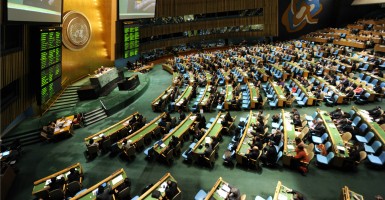Since the Obama administration announced in October 2009 that it would seek to negotiate an Arms Trade Treaty through the United Nations, Congress has regularly cautioned the White House that such a treaty is not in the interests of the United States. After Secretary of State John Kerry signed the agreement in September 2013, Congress stepped up its warnings.
Last month, that opposition reached a new peak of intensity. On Mar. 2, the 12 Republican freshman senators joined their colleagues, led by Sen. Jerry Moran, R-Kan., and Sen. Jim Inhofe, R-Okla., in pledging to reject the treaty. In the House, 34 Republican freshmen joined a letter led by Rep. Mike Kelly, R-Pa., pledging to support the Senate opposition.
Treaty supporters will use the agreement to do what they like to do—criticize the U.S. and Israel—and ignore the egregious misdeeds of other nations.
On Mar. 27, Rep. Kelly released four letters, signed by 90 members, requesting a ban on funding for implementing the treaty. And, on the previous day, 59 senators, including five Democrats, voted for a similar appropriations amendment offered by Inhofe and Moran to the Senate budget resolution for fiscal year 2016. Today, 59 senators and 191 House members are on record opposing the treaty.
Supporters like to argue the only reason for the strong congressional opposition to the treaty is concern about its impact on rights protected by the Second Amendment. That is untrue. Both the Senate and the House letters set out a wide range of concerns on both substance and process.
As the letters point out, one fundamental problem with the Arms Trade Treaty is that its criteria are vague and easily politicized. Treaty supporters will use the agreement to do what they like to do—criticize the U.S. and Israel—and ignore the egregious misdeeds of other nations.
A perfect example of this comes today from Kenya, where the director of Amnesty International, Justus Nyang’aya, notes that, even though Kenya was one of the leaders of the campaign for the treaty, it has not ratified it. According to him, this is a problem because, without the agreement, Kenya cannot fix its lax controls, including those on “civilian possession.”
Perhaps a friend of the treaty should remind Nyang’aya the agreement supposedly is not about promoting civilian gun control. But what Nyang’aya doesn’t admit—what almost no treaty advocate is willing to admit—is that Kenya has been extensively involved in trafficking arms into South Sudan. Its advocacy of the treaty was deeply hypocritical from the start.
This is par for the course for this treaty: When a civilian airliner is shot down in Ukraine, it’s “globalization,” not Russia, that is blamed. When weapons arrive in South Sudan, we need to look at “root causes,” not Sudan, Kenya and other nations that facilitate the gun-running.
Treaty advocates like to talk about the power of the treaty as an instrument to name and shame. But the only nations they are regularly willing to name and shame are the U.S., Israel, and a few other Western democracies. Iran, Venezuela, North Korea, China and Russia—among other dictatorships that specialize in arms-trafficking—go almost unmentioned.
You know a tree by the fruit it bears: The fruit of the Arms Trade Treaty is criticism of the democracies. That is no surprise: Its supporters explicitly declare this was the creation of a “progressive” coalition, and the guiding star of progressivism in foreign policy is the belief that the U.S. is wrong. That’s a fundamental reason why the treaty is a bad idea, and it’s why the continued leadership of Congress in opposing the agreement is welcome and valuable.





























